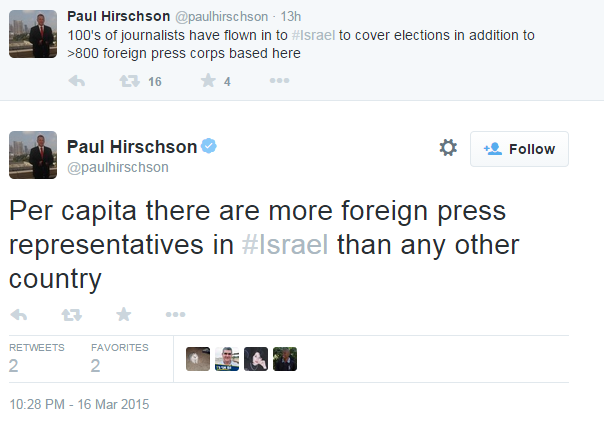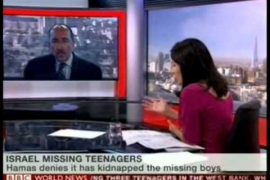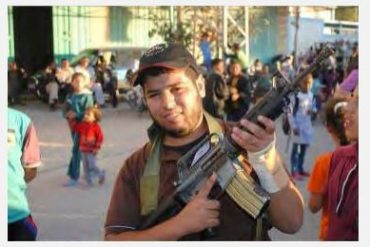The information below – provided by the Israeli MFA’s Paul Hirschson – will not come as a surprise to readers.
Among those foreign journalists who arrived in Israel especially for the election were the BBC’s Middle East editor Jeremy Bowen, its chief international correspondent Lyse Doucet and Turkey correspondent Mark Lowen.
Of course an inflated number of journalists means a high volume of coverage and the BBC is no exception to that rule. However, quantity is not necessarily a guarantee of accuracy or impartiality.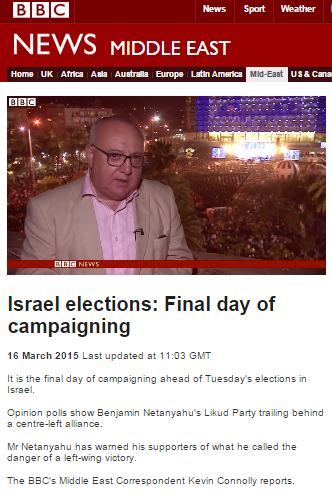
In the days running up to the election the BBC News website’s Middle East page published four items, beginning with an appeal to Israeli voters for interviews on March 6th which later produced an article titled “Israel election: What do voters want?” – previously discussed here. On March 13th Kevin Connolly asked “Israel election: Will outcome revive peace process?” (discussed here) which focused on the topic of the potential effect of the elections on talks with the PLO, despite the fact that Israeli voters had repeatedly made it clear that was not the main election issue. On March 14th the BBC News website finally got round to providing some very limited background information on the leaders of six of the 26 lists running for election in an article titled “Israel election: Who are the key candidates?“.
The day before the election – March 16th – viewers of BBC television news (and visitors to the website) saw a short item titled “Israel election in numbers – 60 secs” and a filmed report by Kevin Connolly titled “Israel elections: Final day of campaigning” which, interestingly, included footage of Connolly at a rally held in Tel Aviv on March 7th – ten days before the “final day of campaigning” – along with footage from the set of the satirical TV programme ‘Eretz Nehederet’ (‘Wonderful Country’) which was actually filmed nearly two months before the elections. Interviewed at the time, Connolly told an Israeli journalist from Channel 10: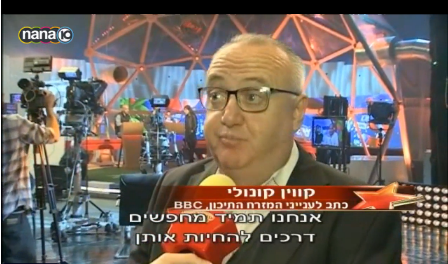
“When we report elections in foreign countries of course we’re always looking for ways to bring them alive and I think nothing brings Israeli politics alive more dramatically than ‘Wonderful Country’. I wouldn’t claim to understand every subtlety of the language but it makes me laugh and that’s the only test it really has to pass.”
Connolly’s two month-old visit to the set of an Israeli TV programme did not only feature in that filmed report: it also cropped up in his report for BBC Radio 4’s ‘Today’ programme on March 16th (here from 2:49:25) along with audio from that same March 7th rally.
“The satirical Israeli TV show ‘Wonderful Country’ portrays Benjamin Netanyahu as a kind of song and dance man. The actor who plays him is slick and polished – blue rinse, comb-over and all. Stories alleging extravagance at the taxpayer’s expense get a nod too. Cartoons of giant pistachio ice creams dance along on the screen. The Netanyahus once reportedly got through $3,000 worth of it in a single year.”
But licence fee payers might be relieved to learn that the incisive analysis they received from the BBC’s Jerusalem correspondent on the topic of the Israeli elections was not entirely based on his impressions of a satirical TV show he admits he does not fully understand. Listeners to the March 16th edition of BBC Radio 4’s ‘PM’ (available here from 47:10) also learned that Connolly had been watching party campaign videos (including this one) on the internet when he went through the rather pointless exercise of describing those visual films made in a language the vast majority of his listeners would not understand.
Both internet videos and ‘Wonderful Country’ cropped up again in an article by Connolly published on the BBC News website on March 16th under the title “Israel election: An end or new era for Netanyahu?“.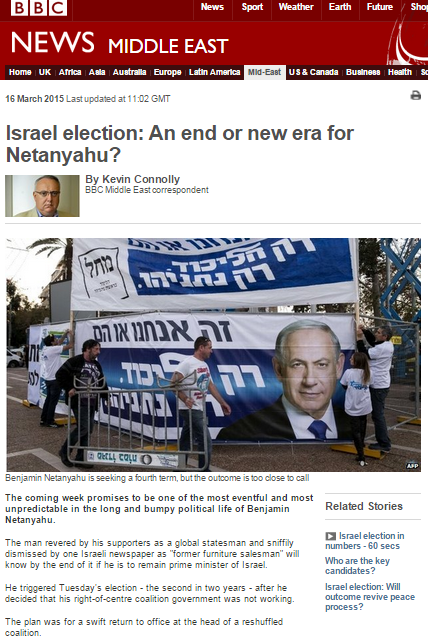
“But other video visions of Mr Netanyahu are available too.
To the producers of the waspish satirical TV show Wonderful Country he is a rather slick song and dance man.
In one of their most memorable programmes the actor portraying him (complete with luxuriant comb-over) mugged his way through a big production number in which giant cartoon pistachio ice-creams appeared on screen dancing along.
That was a not-very-subtle reference to persistent stories that the Netanyahus have something of a taste for high-living at the taxpayer’s expense.
The bill for pistachio ice-cream at an official residence was much-discussed for a while.”
And – as was the case in his radio and TV reports – Connolly relied on the notoriously unreliable Israeli opinion polls as the basis for his informing BBC audiences that electoral change seemed likely to be just round the corner.
“The coming week promises to be one of the most eventful and most unpredictable in the long and bumpy political life of Benjamin Netanyahu.
The man revered by his supporters as a global statesman and sniffily dismissed by one Israeli newspaper as “former furniture salesman” will know by the end of it if he is to remain prime minister of Israel. […]
The final polls before voting day suggest that things may not be going to plan.
They give the Zionist Union – an alliance of Yitzhak Herzog’s Labour Party and the Hatnuah movement headed by former Foreign Minister Tzipi Livni – a clear lead over Mr Netanyahu’s Likud.”
That theme also appeared in another article published on the BBC News website on March 16th under the headline “Israel election: Netanyahu vows no Palestinian state“.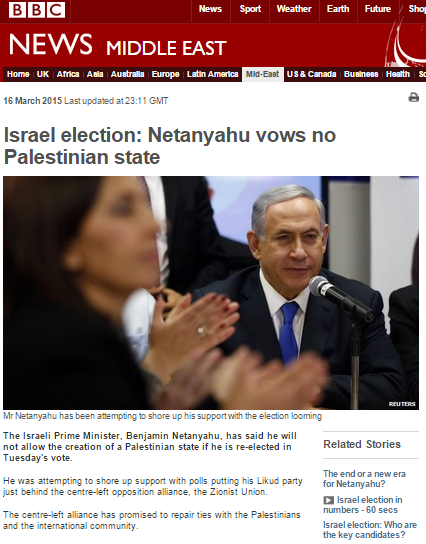
“The Israeli Prime Minister, Benjamin Netanyahu, has said he will not allow the creation of a Palestinian state if he is re-elected in Tuesday’s vote.
He was attempting to shore up support with polls putting his Likud party just behind the centre-left opposition alliance, the Zionist Union. […]
Opinion polls published before the weekend suggest that the centre-left Zionist Union is likely to win the most seats.”
The statement which is the subject of the headline to that article was made in an interview (available in Hebrew here) given by Netanyahu to the Israeli website NRG. Whilst the BBC’s representation of the statement is reasonably accurate in this article, the writer obviously intends to suggest to readers that electoral victory for the Zionist Union would bring about a very different approach to the issue of negotiations between Israel and the Palestinians.
“The centre-left alliance has promised to repair ties with the Palestinians and the international community. […]
Mr Netanyahu has consistently accused his centre-left challengers of being willing to relinquish Israel’s claim to Jerusalem as its indivisible capital in peace talks with the Palestinians.
Also on Monday, Mr Netanyahu spoke at a settlement in East Jerusalem and said he was the only person who could ensure the city’s security.
Palestinians seek East Jerusalem – occupied by Israel since the 1967 Middle East war – as the capital of a future Palestinian state.
The Zionist Union party co-leader Yitzhak Herzog, visiting the Western Wall on Sunday, one of the holiest sites in Judaism, pledged to “safeguard Jerusalem and its residents in actions, not just words, more than any other leader”.
In fact – as the Jerusalem Post has documented – the Zionist Union’s declared policy is not vastly different from that of previous Israeli governments or from the terms of offers already refused by the Palestinian leadership.
“Zionist Union calls for two states for two peoples and a final-status agreement for a two-state solution that would have the support of the Arab world. Israel’s final borders would include the settlement blocs. Palestinian refugees could not return anywhere within Israel’s final borders and should return instead to the future state of Palestine.
Jerusalem would be strengthened as Israel’s eternal capital, according to the party platform.
It does not mention if Jerusalem would be united or divided, although party leader Isaac Herzog has spoken of a united Jerusalem during the elections. He has also spoken in support of freezing building in isolated settlements to halt Israel’s isolation in the international arena and to allow for the conclusion of a final-status agreement with the Palestinians.
Restitution for Jewish refugees for Arab lands would be included in such an agreement.”
The March 16th edition of BBC World Service radio’s ‘Newshour’ included coverage from Tim Franks in Israel who, unlike most of his colleagues, was wise enough to take opinion polls with the pinch of salt they deserve. In that item (available from 26:38 here) Franks spoke with Israeli journalist Tal Schneider once again and conceded that her assessments in the interview she gave him last December were – in contrast to his own reading of the issue – accurate.
“She’d pretty much nailed it last time I’d seen her […] when she said that this vote would be about a referendum on Mr Netanyahu and also turn on his handling of the economy.”
Nevertheless, Franks again brought up the topic which was by no means the main issue in this election at the end of his report:
“One thing we haven’t really mentioned so far is how far this election could change the course of possible political negotiations with the Palestinians in the decades-long conflict. And the opinion polls suggest that a healthy majority of Israelis don’t really think that whatever the outcome of the election that will change much.”
The reason for that, of course, is that most Israelis realise that whichever government they elect it will not – in contrast to the impression consistently promoted by the BBC – be capable of resolving the Palestinian-Israeli conflict alone.
So as we see, in the run-up to the Israeli election BBC journalists across the board were promoting the idea of a change of government in Israel based on opinion polls whilst continuing to steer audience attentions towards the subject of the election’s effects on negotiations with the Palestinians – despite the fact that the issue was not high up among voters’ priorities.
In subsequent posts we will look at BBC coverage on election day itself and after the results were announced.

